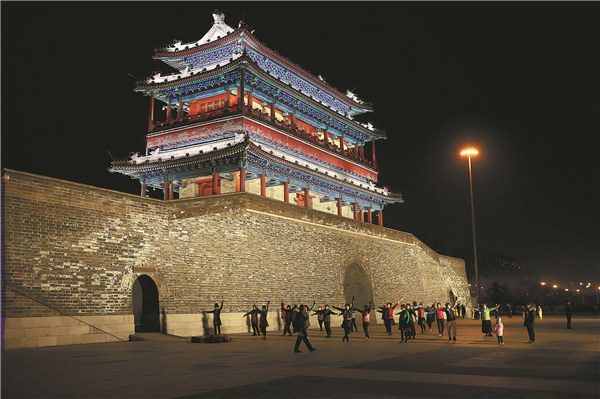文化自信需要文化开放 - 2023-11-15

Residents dance in the square in front of the Yongding Gate, Beijing.
In the past few years, China and its people have been experiencing increased cultural confidence; a deep-seated love for the traditions, arts and practices, or for the myths and stories that fashioned and inspired Chinese culture for centuries is reflected in countless exhibits, plays, movies, novels, video games, as well as in fashion and popular hobbies.
This is a positive phenomenon, especially when it comes along a rediscovery of the diversity of Chinese cultural expressions. This diversity has been fostered by the variety found in geographical regions and schools of thought as well as by the dizzying inventiveness of the great Chinese artists, craftsmen, poets or novelists.
Some people wonder whether increased cultural confidence goes necessarily along a tendency to close in on oneself and reject the culture of others. This is not and should not be the case. In fact, people and nations having developed a healthy dose of self-confidence display more empathy toward others: they do not feel threatened by them, and they look forward to nurturing exchanges that will prove to be mutually beneficial.
In which ways do cultural confidence and cultural openness reinforce each other? The process can be described as follows.
A culture can be defined as a toolbox — as a set of resources that helps people not only to appreciate the richness of human existence but also to meaningfully answer challenges that threaten the cohesiveness or even the existence of the local, ethnic or national community. In our time, globalization is first and foremost the globalization of crises and challenges. Global warming, deforestation, waste of natural resources, migrations, or yet crisis in the educational model represent challenges common to all nations, though with varying degrees of intensity.
Finding a solution to these problems is what everyone wishes; as it benefits all. The feeling of commonality might also arise from the collapse of traditional ways to understand one's world, identity and culture, or from the spreading of a culture of violence at school or in society at large, or yet from the difficulty to implement mechanisms of harmony and reconciliation. As a global community, what we first share is a feeling of urgency and disarray.
When we reach this point, we need to realize anew the variety of the cultural resources we mobilize or could mobilize for answering such challenges. If we do confront common problems and crises, it is true also that there remain tremendous differences among the worldviews or the core values found in Confucian, African or European societies for instance. On authority structures, on relationships with nature, on processes of discussion and evaluation, our ground intuitions, logical approaches, canonical texts and ingrained norms of behavior are varied, divergent or even contradictory.
Furthermore, our cultural traditions are embedded in historical memories that conflagrate one with another. Discovering the wide array of our differences might be, at the same time, exhilarating and extremely puzzling.
This is where a strategic choice is to be made. We can and should decide to make this tremendous variety of cultural resources the toolbox that enables us to interpret anew our own tradition and culture. In other words, people who experience cultural confidence have enough trust in their own resources for investigating and appreciating other cultures without fearing to lose their identity in the process.
Likewise, they welcome the interest shown by representatives of other cultures toward their tradition, and they listen to the insights brought by this exchange of viewpoints and resources. In other words, the resources offered by another cultural corpus may help us to better understand ourselves, to give new life and impetus to the wisdom that our cultures have accumulated throughout the ages. In this perspective, all cultures, creeds and worldviews are perpetually reshaped. What defines them is never taken for granted. Rather, it is both being rediscovered and transformed through a process of exchange and re-interpretation.
Thus, the core of our identity is never "behind" us, it is always "beyond": it perpetually evolves as my relationships with other cultures and consequently with my own culture are continuously deepened and renewed.
Through this process, we give new impetus to our own "localized" culture and wisdom, by the very fact of sharing our resources with others and showing interest for their own resources. At the same time, this reshaping of one's culture does not produce confusion or ambiguity. Rather, it defines and sometimes sharpens one's sense of belonging and core values. The cultural resources we mobilize for finding solutions to global challenges will remain localized, they will remain different in the way they are conceived of and implemented.
However, throughout the exchanges and dialogue we dare to foster, these particular solutions will vary considerably from the ones suggested by an understanding of one's culture and identity that would remain insulated from the rest of the world. When cultural confidence and cultural openness join together, our self-understanding and our inventiveness grow and evolve in ways we would never have imagined.
The author is Benoit Vermander, a professor and doctoral advisor in the School of Philosophy of Fudan University, Shanghai.
Source: China Daily
